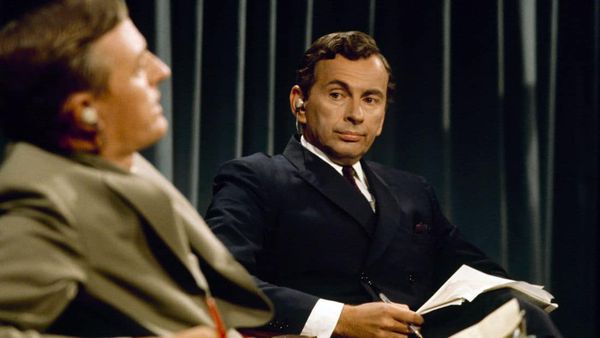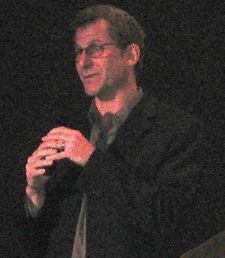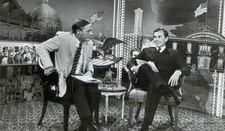 |
| William F. Buckley Jr. and Gore Vidal in Robert Gordon and Morgan Neville's Best of Enemies: "They got into each other's craw. It's like a hook that sunk into the other person." |
Two determined men all set to do battle, William F. Buckley Jr., the conservative trailblazer, and Gore Vidal, renowned author and iconoclast of the left, clash in Morgan Neville and Robert Gordon's high-spirited and illuminating Best Of Enemies. "One must have a mind of winter", to take the cue from Wallace Stevens' poem, The Snow Man, to not be irresistibly drawn in by their bigger-than-life personalities. Dick Cavett, Noam Chomsky, Christopher Hitchens, Matt Tyrnauer, Brooke Gladstone, Ginia Bellafante, Reid Buckley and Sam Tanenhaus give their take on this polarised pair in Best Of Enemies.
At Le Cirque in New York following a dinner honoring the filmmakers, I spoke with Robert Gordon, who is also the author of Can't Be Satisfied: The Life And Times Of Muddy Waters, about waltzes, language, Norma Desmond in Billy Wilder's Sunset Boulevard, Heraclitus and charisma.
 |
| Best of Enemies director Robert Gordon: "Our goal here was not about the argument but it was about how that argument developed." Photo: Anne-Katrin Titze |
Anne-Katrin Titze: You also come from a music background. I just told Morgan how much I liked the placement of the waltzes.
Robert Gordon: It's funny that you focus on the waltzes. Immediately in the beginning I started to look for waltzes because I thought this is a dance. These two guys are engaged in a dance with words. The waltz was the simplest way to convey that sense of rhythm.
AKT: Strauss waltzes?
RG: Yeah. We went through a lot of different pieces of music. We threw out a lot of known pieces and replaced them with our own compositions, that we hired someone to make. It was about the dancing. It was about the way that they maneuvered around each other with words seemed to be a dance. When we composed our own music it was always about the way these two guys interacted with their words.
AKT: It is fascinating to watch the changes in their interactions. It takes a special kind of person to have a relationship like that. Do you have enemies like that? You don't look like you do. Nor does Morgan.
RG (laughing): It's the other side of the coin. Morgan and I, this is the fifth film we've made together. We get along really well. The other side of that coin is not getting along and enmity. Morgan and I have a very good exchange of ideas and respect for each other.
AKT: You don't fight a lot?
RG: No, we don't fight a lot.
_225.jpg) |
| Christopher Hitchens in Best Of Enemies: "enormous opportunity for the practice of malice." |
AKT: Did you fight at all about anything on this project?
RG: We disagreed - I can't even think what we disagreed about. The flip side of that is these guys, Vidal and Buckley. Morgan and I have a friendship that will go on all of our lives, these guys had an enmity that lasted all their lives. You can relate to the inverse of what you know.
AKT: Did you ever feel jealous to have an enemy like that? That you would want that? A longing for the intensity of the enmity?
RG: No.
AKT: They couldn't let it go. It was Norma Desmond, it was Sunset Boulevard.
RG: Exactly. Clinging. I think Sam Tanenhaus kind of captured it when he talked about going into the Esquire articles. That they just couldn't let it go. They got into each other's craw. It's like a hook that sunk into the other person. And when you wanted to get as far way as you could from that person - instead these guys stayed closer and closer together.
AKT: The charisma, is that what we long for today?
RG: I think our longing is not for that charisma. I think our longing is for the respect that the network, that television gave to...
AKT: Thinkers!
 |
| William F. Buckley Jr. and Gore Vidal: "Our film makes you really consider the motives of the other side." |
RG: Thinkers! Yeah, exactly. That they said, "look, 15 minutes a night, uninterrupted, you can develop ideas, you can have an argument." It's not about I say black and you say white, let's fight. It's not about the rumble. It's about the prelude to the rumble. It's about why do we dislike each other. Our goal here was not about the argument but it was about how that argument developed. It was the meta, the wider view, the bigger view.
AKT: What is truly fascinating for me is their language.
RG: Oh my god, these guys had such command of language. Not only words but also discourse. It was not just about having the right word but how to relay that word. You know, as a filmmaker you look at this kind of stuff and you go, 'am I ready to give a year or five years of my life to this?' And with this topic, with these guys, I wanted this. I spent the first couple of months with a dictionary. I wanted to understand everything they were saying and what the roots of those words were and why they chose those words. When was the last time you heard anyone quote Heraclitus on national TV? These guys brought all that command of language and history to the debate.
AKT: True. As repulsive as Buckley's arguments are to me, I am enthralled by him.
RG: One of the film's objectives is that it humanises both sides. In our society today, it's all about dehumanising the other side. It's like "no one can think the way you think, you're an animal!" Our film makes you really consider the motives of the other side. I think they are both genuine. There's so much more to be gained by understanding what the other person is saying and where they're coming from than to just dismiss them. And we're in a society of dismissal.
Read what Morgan Neville had to say about Best Of Enemies.





















